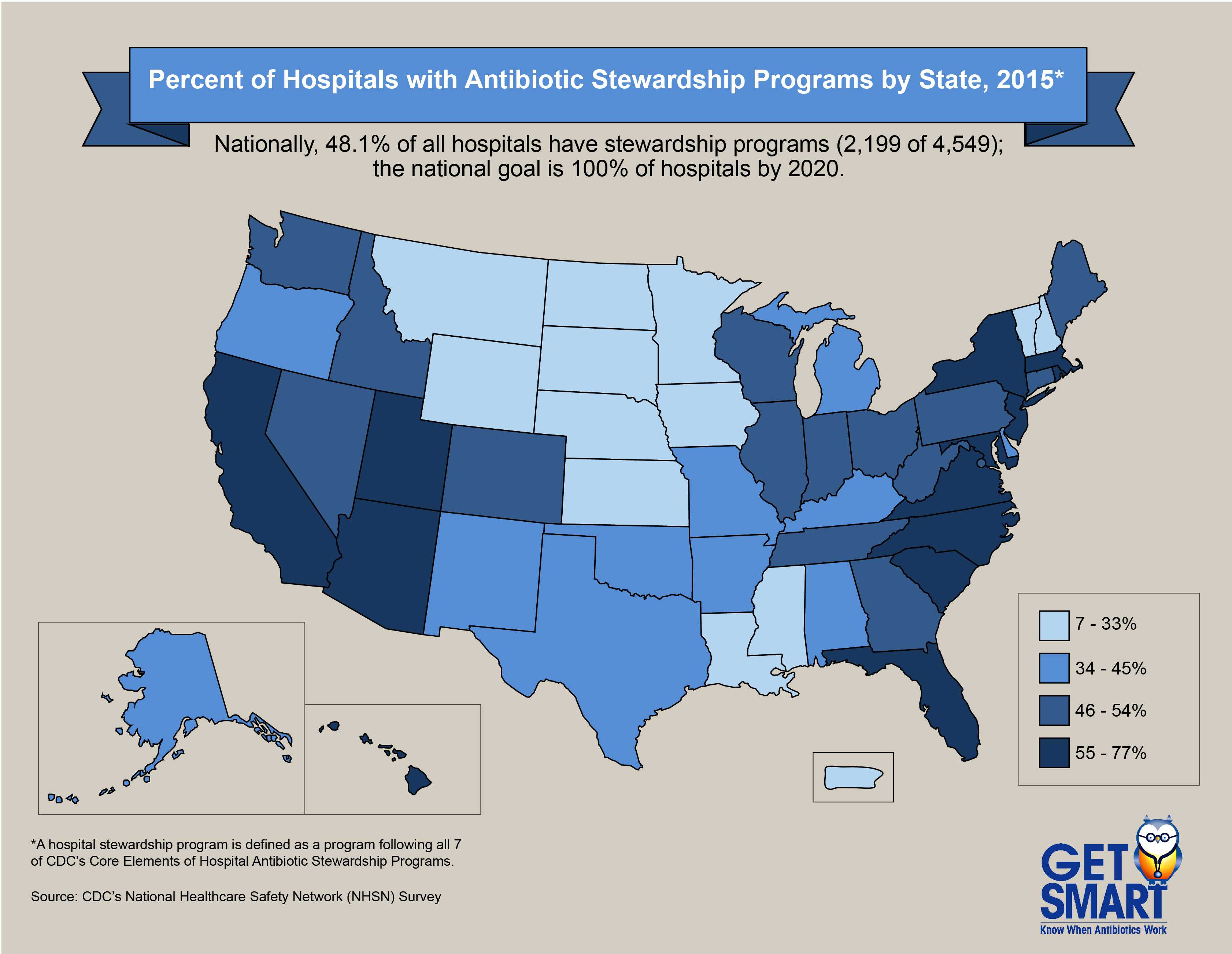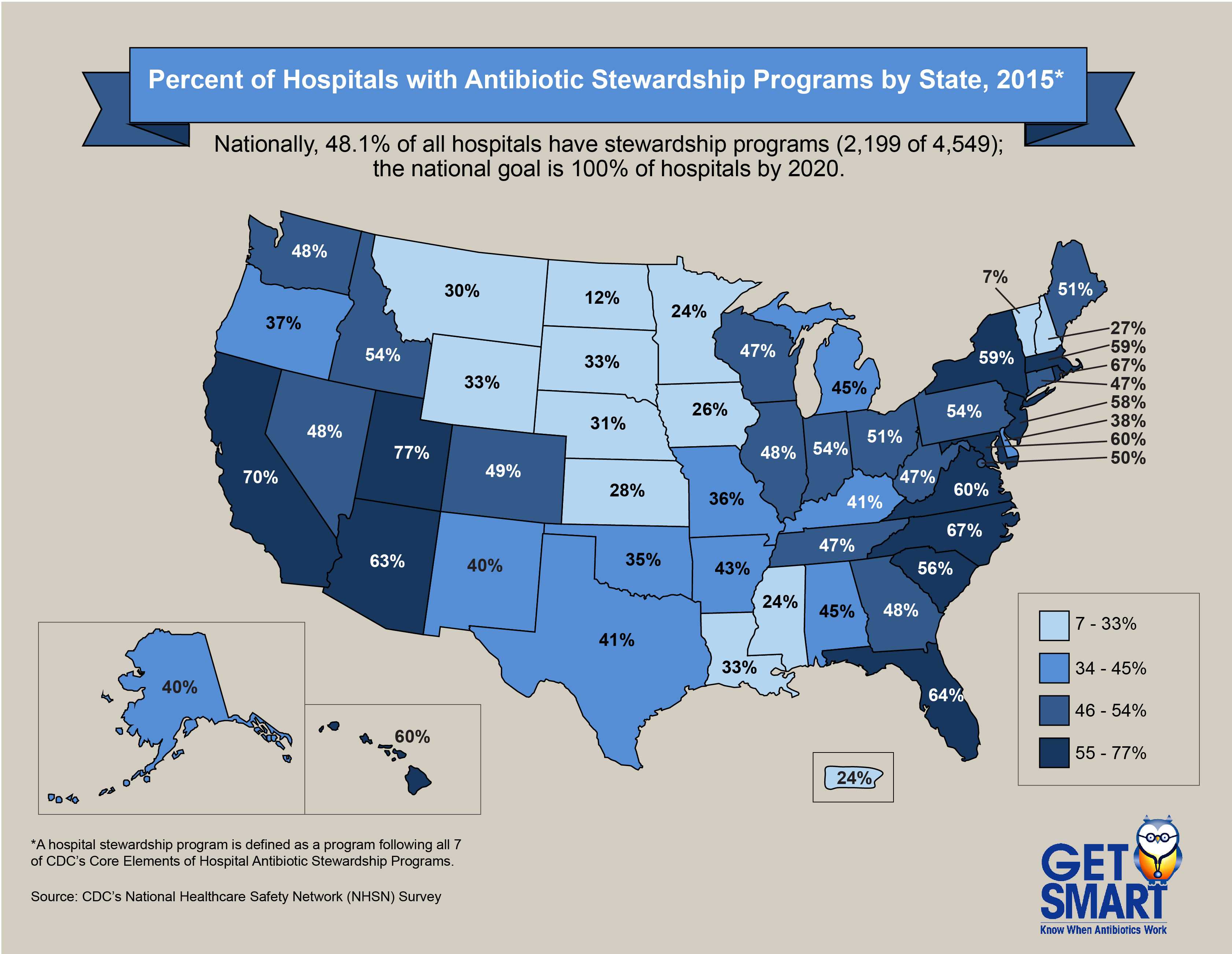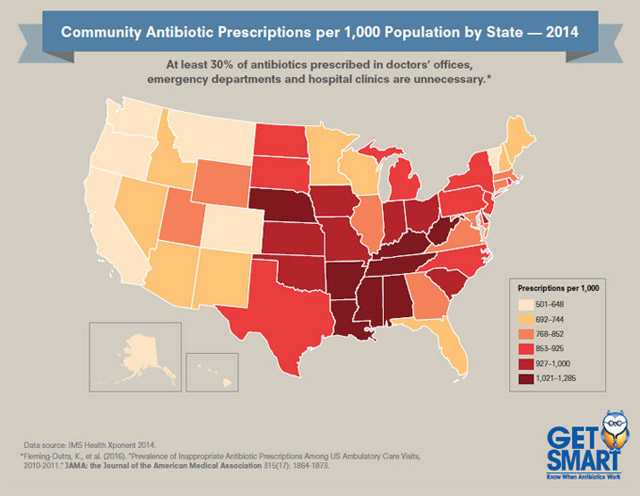Get Smart About Antibiotics Week 2016
Protecting patients with the right drug, dose and duration
Each year in the United States more than 266 million prescriptions for antibiotics are written in doctors’ offices and emergency rooms. Studies show 30% of these antibiotics are not needed and can actually be harmful.
Get Smart about Antibiotics Week, November 14-20, focuses on raising awareness about the risks of using these miracle drugs inappropriately and their impact on antibiotic resistance. The week long observance comes less than two months after the United Nations identified antibiotic resistance as the “greatest and most urgent global risk” and called on world governments to combat antibiotic resistance in medicine, agriculture, and the environment.
As the leading government agency tracking antibiotic use in the United States, CDC has expanded the Antibiotic Resistance Patient Safety Atlas to include the most complete data currently available on the rate of antibiotic prescribing in each state. Studies show that nearly 154 million visits each year to outpatient facilities result in an antibiotic prescription. Southern states have the highest prescribing and Western states the lowest. This interactive tool also provides data about healthcare-associated infections (HAIs) caused by antibiotic resistant bacteria, which are reported to CDC through the National Healthcare Safety Network (NHSN).
In addition, CDC has developed the Core Elements of Outpatient Antibiotic Stewardship, a resource outlining policies and practices that individual clinicians and outpatient facilities are encouraged to adopt to improve antibiotic use and prevent the following:
- 1 in 5 emergency department visits for adverse drug events are caused by side effects from antibiotics
- 50% of the antibiotics prescribed for acute respiratory infections are not needed
- 50% of patients do not get the recommended antibiotic for their condition; targeted antibiotics are more effective and help slow antibiotic resistance
Patients also play a critical role in preventing antibiotic resistance and improving antibiotic stewardship. Get Smart about Antibiotics Week is an opportunity for patients to learn how widespread overuse of antibiotics and incorrect prescribing practices can drive drug resistance, and result in unnecessary side effects, allergic reactions, and serious diarrheal infections caused by Clostridium difficile. Complications of antibiotic therapy can have serious outcomes, even death.
Contact Information
CDC Media Relations
(404) 639-3286
media@cdc.gov
Spokespersons
Lauri Hicks, DO
“It’s imperative that patients receive the right dose of the right antibiotic, for the right amount of time and only when necessary. When antibiotics are inappropriately prescribed and used, we jeopardize the health of patients, and we jeopardize the effectiveness of the antibiotics available to fight serious infections.”
Lauri Hicks, DO – Director, Office of Antibiotic Stewardship
Katherine Fleming-Dutra, MD
“Improving the use of antibiotics is an important patient safety and public health issue. Studies show that 30% of the antibiotics prescribed in doctor’s offices, clinics and other outpatient facilities are not needed. This indicates that improving antibiotic prescribing in outpatient settings is urgently needed. CDC’s Core Elements of Outpatient Antibiotic Stewardship outlines the steps clinicians and outpatient facilities should take to improve antibiotic prescribing.”
Katherine Fleming-Dutra, MD– Medical epidemiologist, Office of Antibiotic Stewardship
Arjun Srinivasan, MD (CAPT, USPHS)
“We find that for inpatient care, hospitals are embracing antibiotic stewardship programs and actively working to create an environment that encourages physicians to provide the best antibiotic therapy for their patients and continue to improve antibiotic prescribing practices. We hope to see the same results in outpatient clinics and doctor’s offices. Improved antibiotic prescribing by all physicians will lead to a reduction in resistance, a reduction in drug side effects and a reduction in complications like Clostridium difficile infections, which can be deadly.”
Arjun Srinivasan, MD – Associate Director, Healthcare Associated Infection Prevention
Related Links
- Get Smart About Antibiotics Week
- Get Smart About Antibiotics Week: What You Need to Know
- Core Elements of Outpatient Antibiotic Stewardship
- Antibiotics Aren’t Always the Answer
- How Antibiotic Resistance Happens
- Antibiotic Resistance – The Global Threat
- Resistance Anywhere is Resistance Everywhere
- Antibiotic Resistance Patient Safety Atlas: Hospital Antibiotic Stewardship Programs by State Data (2014-2015)
- Antibiotic Resistance Patient Safety Atlas: Outpatient Antibiotic Prescriptions by State Data (2011-2014)
- Antibiotic Resistance Patient Safety Atlas: Healthcare Facilities Reporting HAIs by State Data (2011-2014)
- CDC Clostridium difficile Infection Website
- Federal Engagement in Antibiotic Resistance
- Core Elements of Hospital Antibiotic Stewardship Programs
- The Core Elements of Antibiotic Stewardship for Nursing Homes
- Antibiotic Resistance Solutions Initiative
- CDC Safe Healthcare Blog: CDC, OSAP Issue Best Practices for Dentists Prescribing Antibiotics
- CDC Safe Healthcare Blog: New Guide Developed to Help U.S. Hospitals Improve Antibiotic Use; A National Health Priority
- CDC Safe Healthcare Blog: Why Do We Prescribe Antibiotics When They Aren’t Needed?
- CDC Safe Healthcare Blog: National Targets Set to Help Reduce Inappropriate Antibiotic Prescriptions in Outpatient Settings
- Antibiotic Resistance Patient Safety Atlas
Print Material
- Get Smart Week Ad for Parents of Younger Child
- Get Smart Week Ad for Parents of Older Child
- Get Smart Week Ad for Providers
- Get Smart Week Ad for Pharmacists
- Healthcare Professional Commitment to Antibiotic Stewardship Posters
- Antibiotic Prescription Adherence and Non-Prescription Tools
- Preventing and Treating Ear Infections
- Viruses or Bacteria: What’s Got You Sick
- Antibiotic Safety: Do’s and Don’ts at the Dentist
Videos
- Page last reviewed: November 14, 2016
- Page last updated: November 14, 2016
- Content source:



 ShareCompartir
ShareCompartir








